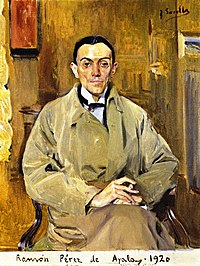| This article includes a list of general references, but it lacks sufficient corresponding inline citations. Please help to improve this article by introducing more precise citations. (May 2014) (Learn how and when to remove this message) |
You can help expand this article with text translated from the corresponding article in Spanish. (June 2018) Click for important translation instructions.
|
| Ramón Pérez de Ayala | |
|---|---|
 Pérez de Ayala in 1931 Pérez de Ayala in 1931Photograph by Ricardo Martín [es] (1882-1936) | |
| Ambassador of Spain to the United Kingdom | |
| In office 1931 (1931)–1936 (1936) | |
| Deputy of the Cortes Republicanas for Oviedo Province | |
| In office September 17, 1931 (1931-09-17) – May 5, 1933 (1933-05-05) | |
| Personal details | |
| Born | (1880-08-09)August 9, 1880 Oviedo, Spain |
| Died | August 5, 1962(1962-08-05) (aged 81) Madrid, Spanish State |
| Alma mater | University of Oviedo |
| Occupation | Writer |

Ramón Pérez de Ayala y Fernández del Portal (9 August 1880, in Oviedo – 5 August 1962, in Madrid) was a Spanish writer. He was the Spanish ambassador to England in London (1931-1936) and voluntarily exiled himself to Argentina via France because of the Spanish Civil War (1936-1939). He was nominated for the Nobel Prize in Literature.
Background
Pérez de Ayala was educated at Jesuit schools, the experience of which he satirized in the novel A.M.D.G. (1910). The novelist Leopoldo Alas was among his professors, and Alas's "intellectual novel," focused on ideas and philosophy, would influence Pérez de Ayala's own fiction. There is some debate regarding to which generation of Spanish writers Pérez de Ayala belongs. His early realistic novels reveal ties with the Generation of 98. However, some argue that Ramon Pérez de Ayala was a member of the Generation of 1914, a group which did not entirely fit with either the Generation of 98 or the Generation of 27. Like his political ally José Ortega y Gasset, he was a liberal republican and opposed to the Spanish monarchy, as well as a professed Anglophile who sought to import the English parliamentary system to Spain.
He was elected to the Royal Spanish Academy in 1928, and received nominations for the Nobel Prize in Literature in 1931, 1934 and 1947. He was appointed director of the Prado Museum in 1931 a position that he left temporarily in 1932 to become the Spanish ambassador to Britain. Perez de Ayala received an honorary doctorate from the University of Oxford in 1936. He was succeeded as director of the Prado Museum by Pablo Picasso in 1936.
After 1916, his novels became increasingly mature and lyrical, his characters becoming symbolic representatives of general human problems. To this period belongs his masterpieces, Belarmino y Apolonio (1921) (translated as "Belarmino and Apolonio"), Tiger Juan (1926) and El curandero de su honra (The Healer of his Honour) (1927).
La paz del sendero (The Peace of the Path) (1903), El sendero innumerable (1916), and El sendero andante (1921), his major poetic works, show the influence of French symbolism. He also wrote satiric essays and dramatic criticism.
Works available in English
- Belarmino and Apolonio (1990) Quartet Books. ISBN 0-7043-0109-1
- Honeymoon, Bittermoon (1974) University of California Press. ISBN 0-520-01727-7
- Sunday Light. In: Sáenz, Paz, ed. (1988). Narratives from the Silver Age. Translated by Hughes, Victoria; Richmond, Carolyn. Madrid: Iberia. ISBN 84-87093-04-3.
- Tiger Juan translator Walter Starkie, J. Cape, 1933, OCLC 3253788
References
- ^ Amorós Guardiola, Andrés. "Ramón Pérez de Ayala" (in Spanish). Real Academia de la Historia. Retrieved 2024-09-03.
- "PEREZ DE AYALA , RAMON 54. Elecciones 28.6.1931" (in Spanish). Congreso de los Diputados. Retrieved 2024-09-03.
- "Nomination Database". www.nobelprize.org. Retrieved 2017-04-19.
- Bédé, Jean Albert (1980). Columbia Dictionary of Modern European Literature. Columbia University Press. p. 609.
- Bédé, Jean Albert (1980). Columbia Dictionary of Modern European Literature. Columbia University Press. pp. 609–610.
External links
- Works by Ramón Pérez de Ayala at Project Gutenberg
- Works by or about Ramón Pérez de Ayala at the Internet Archive
| Real Academia Española seat C | |
|---|---|
| |
| He was elected in 1884 but never took the seat; He was elected in 1906 but never took the seat; He was elected in 1907 but never took the seat; He was elected in 1928 but never took the seat |
- 1880 births
- 1962 deaths
- People from Oviedo
- Members of the Congress of Deputies of the Second Spanish Republic
- Politicians from Asturias
- Spanish male writers
- Modernist writers
- Writers from Asturias
- Members of the Royal Spanish Academy
- Directors of the Museo del Prado
- Exiles of the Spanish Civil War in Argentina
- Colegio de la Inmaculada (Gijón) alumni
- University of Oviedo alumni
- Spanish diplomats
- Exiles of the Spanish Civil War in France
- Exiled Spanish politicians